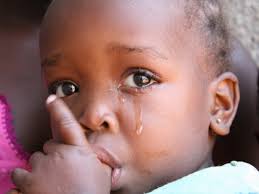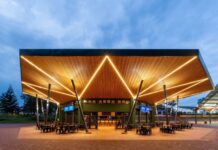|
Cash assistance in Kenya’s Kalobeyei settlement allows refugees to build their own homes with materials bought from the local community
|
|
|
When South Sudanese mother Florence Idiongo joined thousands of refugees fleeing to Kenya three years ago, she had to live in a plastic tent with 12 people, including her children, younger siblings and other relatives.
It was hot, crowded and offered minimal protection for her and her family, who had to watch over their food and other belongings constantly. “We sometimes had to cook inside the tent during the rainy season and this was very risky for the children’s health,” she adds. Fortunately, her situation has changed for the better. With an ATM card and some guidance from UNHCR, the UN Refugee Agency, she has been able to withdraw funds and join more than 1,000 refugees building better and safer housing in the Kalobeyei settlement, according to their needs. “We sometimes had to cook inside the tent during the rainy season and this was very risky for the children.” The project had its origins in June 2015 when Kalobeyei was launched to relieve overcrowding in the long-established Kakuma camp next door. Among the new settlement’s principal objectives was to improve the socio-economic conditions of refugees and the local host communities. Key to this improved assistance has been UNHCR’s innovative cash-based intervention where refugees like Florence receive cash on special ATM cards to buy cement, sand, stone blocks and other materials to build houses and latrines. “We wanted to accord more dignity to the people and give them freedom of choice,” says Moffat Kamau, UNHCR’s Senior Cash Based Intervention Associate based in Kakuma. Kamau adds that this strategy is in-line with Kalobeyei’s objective of ensuring socioeconomic integration of refugees in the local community while reducing dependency on humanitarian assistance. “Refugees have ownership of the construction process and there’s value for money as they can build better houses at lower costs,” he adds. Millions of refugees and others of concern in scores of countries worldwide have been able to take greater control of their lives since UNHCR began expanding cash-based assistance in 2016. Cash assistance is part of a wider range of initiatives through which UNHCR, in partnership with donor countries, governments and private sector partners are strengthening the new response to refugee situations across the world. The programme aims to help refugees, asylum-seekers, returnees, internally displaced and stateless people meet their needs in dignity, ensuring they are better protected and can become more resilient. In the past three years it has helped more than 16 million people in above 100 countries to build or improve homes, pay their rent, buy medicine, pay off debts or even start a business, among other activities. UNHCR now provides more cash than in-kind aid. In Kalobeyei, each compound of shelters consists of 12 to 14 houses which can be built in an average of 22 days. Refugees have bargaining power when buying construction materials as they collaborate with their neighbours to procure in bulk. This efficient and effective use of funds allows them to spend the remaining money on home improvements or other basic needs, like soap and cooking materials. “By giving refugees cash to build their own houses, we empower the entire community to take charge of their lives,” adds Kamau. “This process has improved their relations with the local community as the money they spend goes back into the local economy.” UNHCR has partnered with Equity Bank in Kenya to open bank accounts for refugees who then use their special debit cards to access the cash for constructing their shelters. The money is sent in three instalments to ensure that families build the houses in a structured manner and in compliance with construction standards developed by UNHCR’s shelter experts. “This process has improved relations with the local community as the money goes back into the economy.” As Florence has a large family, she is eligible for assistance to build two permanent houses and has already built one house to completion. “I feel happy. You see your house is different and you’re just comfortable inside,” she says with a smile. “You can buy clothes for the children and you can also buy a mattress, chairs and curtains and you will feel okay.” So far, over 1,000 refugees, including Florence, have been able to build safer and more durable houses through the project, supported by key donor countries including the Government of Japan. The project’s success will be showcased later this week at the Tokyo International Conference on African Development, an annual event led by the Japan government, in partnership with UNDP, the Africa Union Commission and the World Bank. At the Global Refugee Forum to be held this December, countries will explore initiatives and other ways of how to better share and strengthen the international response to refugee situations. Success stories such as the shelter project in Kalobeyei will be used to illustrate how comprehensive responses are already transforming the lives of refugees like Florence and their hosts in many parts of the world. They are also essential for inspiring the international community to develop impactful contributions in the future that carry the momentum of the Global Compact forward. The forum comes after the Global Compact on Refugees that was agreed upon in December 2018 by the UN General Assembly and will bring together governments, international organizations, local authorities, civil society, the private sector, host community members and refugees themselves. As Florence expects her fifth child, she looks towards the future with renewed hope. “I want the future of my children to go forward. I will manage this money and build another house,” she says. “I am very happy.”
|
Welcome!Log into your account

















